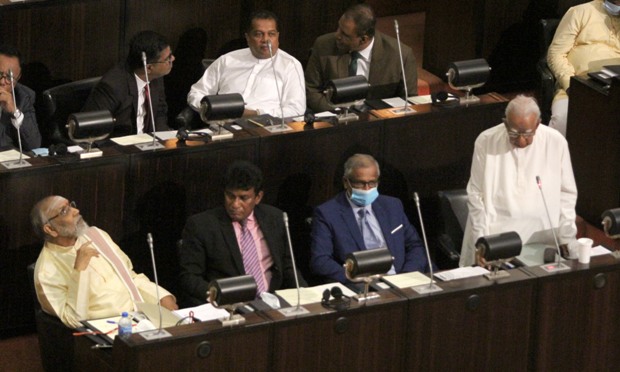Opposition Lawmakers Slam Sri Lanka Central Bank, EPF For ‘Lying’ To Members
The debt plan was passed with 122 voting in favour and 62 against
COLOMBO – Sri Lanka’s central bank and the Employment Provident Fund (EPF) will commit an ‘enormity’ in re-structuring fund assets without members’ consent, amid a history of mis-disclosed data and questionable investments, legislators told parliament.
Sri Lanka last week disclosed a plan to meet International Monetary Fund ceilings on borrowings and debt rollovers (Gross Financing Need), by extending the maturities of central bank and EPF held government securities.
Bond re-structuring was earlier promised to be voluntary, but authorities said funds that do not exchange bonds will be charged a 30 percent tax instead of 14 percent. Consenting to the re-structure would boost returns.
False Claim
The EPF is managed by Sri Lanka’s central bank, which in legal terms is its Monetary Board.
“It is absolutely false when you say that this is a voluntary participation,” opposition legislator M A Sumanthiran told parliament, in a debate on the debt plan which was passed with 122 voting in favour and 62 against.
“The EPF Act says the custodian is the Monetary board. I want to ask them.
“Are you being responsible custodians and making this decision on behalf of 2.5 million members, working class members of the EPF?”
The formal offer is to be made after the passage of the plan in parliament, and which will close on July 25.
Dragged and Hanged?
On Friday the Superintendent of the EPF had told the parliament’s committee on Public Finance that they had no knowledge of the plan and he saw it on facebook, Sumanthiran said.
“That is the extent to which this enormous, this onerous responsibility cast, is being exercised,” Sumanthiran said.
“We heard one member of the monetary board say, ‘This is an important thing, this is a very serious thing, all of us will be dragged and hanged for doing this’.
“He has understood the enormity.
“And I want to put them on notice, that is what will happen to them, if they dare take this decision or participate in this debt restructuring exercise without consulting the membership.
The EPF is to get 12 bonds in return for its current portfolio, which will pay 12 percent up to 2025 and 9 percent till 2038. The bond will mature from 2027 onward to market rates.
Opposition legislator Harsha de Silva, who chairs the Committee on Public Finance, which approved the debt plan with a majority vote also questioned the lack of consent.
“Who will decide whether to agree to this proposal or not?” de Silva asked. “We all know that there is no representative of members in the management board of the EPF.
“Though there are 2.5 million members, at least a trade union leader or one representative of the members are not there.”
Sumanthiran said the membership could be consulted through a survey.
“If it is to be voluntary, it must necessarily have the consent or at least some views of the membership,” Sumanthiran said.
“Don’t lie to the country. Don’t lie to the people. that they are voluntarily participating in this matter.”
Sovereign bonds now have covenants built into their contracts through ‘collective action clauses’ allowing for restructuring, after the practice was adopted in the late 1980s amid an epidemic of ‘flexible exchange rate’ (soft-peg) collapses in Latin America and Eastern Europe.
There are no such provisions in Sri Lanka rupee bonds.
Authorities are walking a tight rope to meet GFN targets, which the IMF claims are required to make the country’s debt ‘sustainable’ without de-stabilizing the banking system and harming bank deposits.
Mis-disclosed?
There have been criticisms that EPF funds were being mis-used for financial repression by economic bureaucrats running the central bank and the Treasury to further their ideology of suppressing market interest rates.
In recent years questions have been raised over the EPF’s link to a so-called bond scam in 2015 and 2016 as well as questionable purchases of stocks at high prices around 2011. The EPF also bought SriLankan Airlines shares when Emirates was forced out and has since made losses.
EPF does not publish its annual reports on time and at one time it was six years late, Sumanthiran said.
In their financial statements a ‘serious misrepresentation’ had been made, Sumanthiran claimed in parliament.
According to the EPF’s governing law, each investment should be disclosed at their face value, purchase price and market value of each of the investments he said.
“But in their financial statements, they say the law requires us to publish the face value, purchase price, market value of each type of investment,” Sumanthiran said.
“They have changed. It is a false statement of what the law requires them to do. When the question was asked they had no answer to give.”
Sumanthiran claimed the agency was ‘lying through their teeth’.
“Is this the body that can be trusted to be a proper custodian?. And we have a history of the EPF. Through bond scams, through various methods, the EPF has been eaten into.”
Sumanthiran was speaking immediately after the speech of Prime Minister Dinesh Gunewardene.
“You have always stolen from the EPF,” Sumanthiran said.
“All these platitudes from the Honourable Prime Minister falls flat on their face. It is always the EPF and ETF that you have dipped into. Because they are voiceless. They are working class and it is easy for you to do this. And you do not give them a voice.
“You appoint the central bank, the Monetary Board, to be the custodian, to make decisions on their behalf.
“This restructuring plan is theirs. This restructuring plan comes from the Treasury and central bank. The very same people make decisions on behalf of the EPF.” – EcononmyNext



Comments are closed, but trackbacks and pingbacks are open.